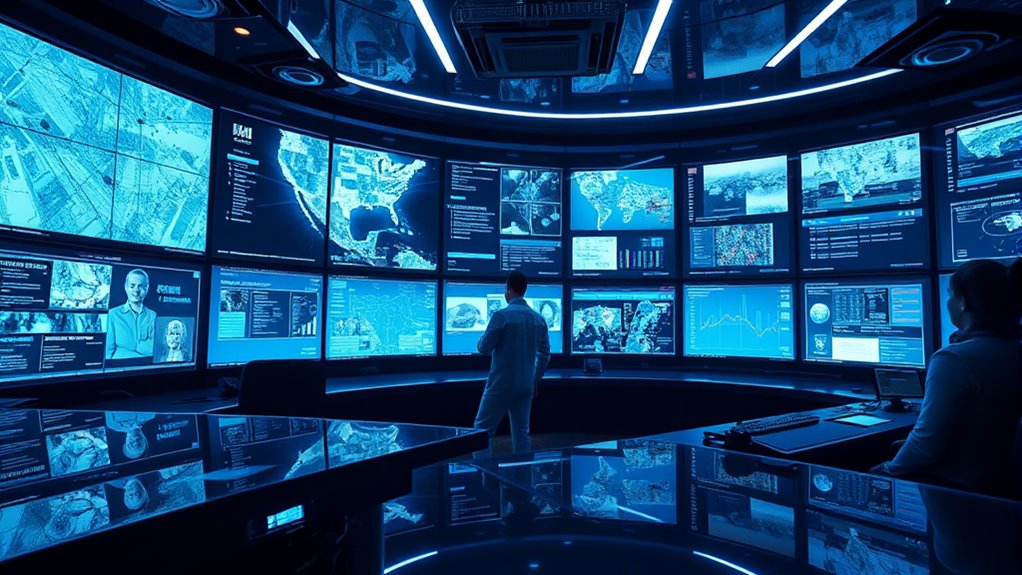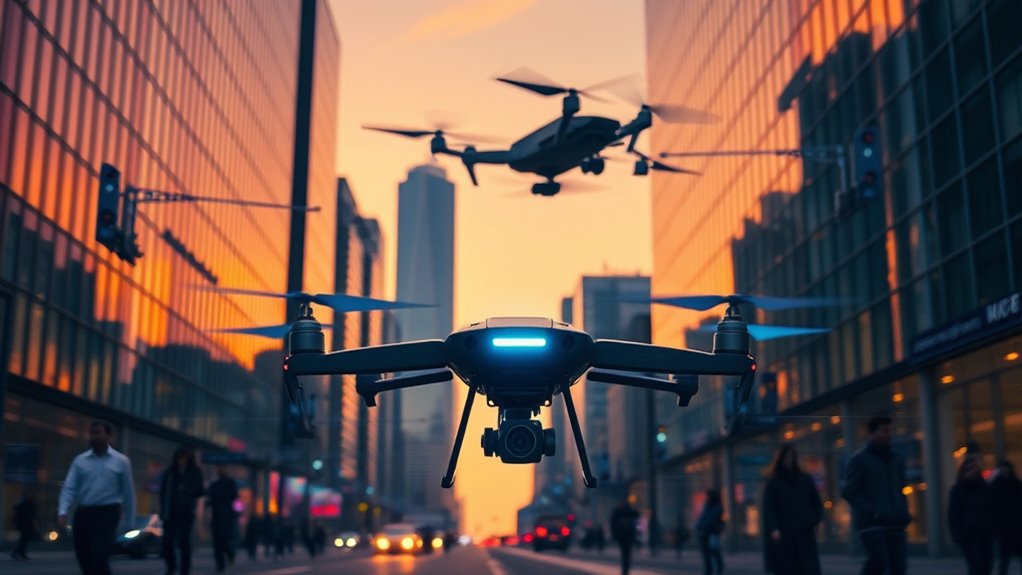The ethics of surveillance technologies involves balancing security benefits with respecting personal privacy. You should consider how increased data collection can intrude on individual autonomy and lead to misuse if oversight isn’t strong. While surveillance can boost safety, unchecked power risks abuses that threaten freedoms. Transparency, accountability, and strict regulations are essential to prevent overreach and protect rights. If you want to understand how to navigate these ethical complexities, there’s more to discover ahead.
Key Takeaways
- Ethical surveillance balances security benefits with the protection of individual privacy rights.
- Transparency and accountability are essential to prevent misuse and ensure responsible data handling.
- Oversight mechanisms help mitigate risks of abuse and overreach by authorities.
- Privacy concerns arise from extensive data collection and potential intrusion into personal routines.
- Developing adaptable ethical frameworks is crucial as surveillance technologies evolve and societal norms change.

Surveillance technologies have become integral to modern life, yet their rapid growth raises critical ethical questions. As you navigate a world filled with cameras, sensors, and data collection systems, you might wonder how much of your personal life is truly private. Privacy concerns are at the forefront of these debates, especially as governments expand their oversight capabilities. While surveillance can enhance security and public safety, it often comes at the expense of individual privacy. You may feel that your movements, communications, or even daily routines are constantly being monitored, which can lead to a sense of intrusion and loss of autonomy. Governments justify this oversight by citing national security needs, but the line between necessary oversight and overreach is often blurred. When authorities have access to large amounts of data, there’s a risk that this information could be misused or mishandled, raising questions about accountability and transparency. You need to contemplate whether the benefits of surveillance—such as preventing crime or terrorism—outweigh the potential erosion of your rights and freedoms. Additionally, the use of cookies and data collection practices by websites further complicates privacy issues in the digital age. The issue of government oversight becomes even more complex when you think about how policies are implemented and enforced. Governments might argue that surveillance helps maintain order, but unchecked power can lead to abuse. Without strict oversight and clear regulations, there’s a danger that surveillance tools could be used to suppress dissent or target marginalized groups. As a citizen, you should be aware of the importance of oversight mechanisms designed to prevent such abuses. These could include judicial review, independent audits, or transparency reports that detail how data is collected and used. When oversight is robust, it acts as a safeguard to ensure that surveillance is proportionate and justified. Conversely, weak oversight can result in unchecked surveillance, creating a surveillance state where your privacy is continually compromised. You also need to recognize that the balance between privacy and security isn’t static; it evolves with technological advancements and societal values. As surveillance capabilities grow, so does the need for ethical frameworks that protect your rights. Engaging in informed debates and advocating for policies that prioritize transparency and accountability can help shape a future where surveillance serves the public good without infringing on individual privacy. Ultimately, the ethical use of surveillance technologies depends on maintaining a careful balance—one where government oversight is effective, transparent, and respects your fundamental rights.
Frequently Asked Questions
How Do Surveillance Technologies Impact Mental Health?
Surveillance impact can negatively affect your mental health by creating constant feelings of being watched, which may lead to anxiety, stress, and paranoia. You might feel a loss of privacy and trust, making it harder to relax or express yourself freely. This ongoing monitoring can also cause you to become more cautious or suspicious, ultimately increasing your overall stress levels and impacting your emotional well-being.
Are There Cultural Differences in Surveillance Ethics?
You’ll find that cultural differences paint diverse landscapes of surveillance ethics, like varied melodies in a global symphony. Cross-cultural norms shape what’s acceptable, revealing a dance between transparency and privacy. Ethical relativism suggests that what’s right in one society might be wrong elsewhere, turning moral boundaries into shifting sands. So, as you navigate these waters, remember that understanding local values helps you respect each culture’s unique rhythm and ethical tune.
What Legal Frameworks Govern Surveillance Technology Use Worldwide?
You need to understand that legal frameworks governing surveillance technology use worldwide focus on legal compliance and privacy legislation. Countries implement laws to safeguard individual privacy, like the GDPR in Europe or CCPA in California, which set strict rules on data collection and monitoring. You must stay informed about these regulations to ensure your surveillance practices respect local laws, avoid legal penalties, and uphold ethical standards across different jurisdictions.
How Can Individuals Protect Their Privacy From Surveillance?
To protect your privacy from surveillance, you should prioritize privacy preservation by using encrypted communication tools and secure networks. Employ data anonymization techniques to shield your personal information online. Be cautious about sharing details on social media, and regularly update your privacy settings. Using VPNs and avoiding suspicious links also helps minimize tracking. Staying informed about your rights and advocating for stronger privacy laws can further safeguard your personal data.
What Are Future Ethical Challenges in Surveillance Innovation?
You’ll face future ethical challenges in surveillance innovation, especially around predictive analytics and algorithmic bias. As technology advances, you must consider how algorithms might unfairly target or discriminate against certain groups. Ensuring transparency and fairness becomes vital, so you can advocate for policies that prevent misuse. Staying informed and active in discussions about these issues helps you protect individual rights and promote responsible technological development.
Conclusion
As you navigate the ethics of surveillance technologies, remember to question the purpose, consider the privacy, and weigh the impact. You must decide whether to prioritize security or freedom, control or trust, progress or privacy. By staying vigilant, by staying informed, you can shape a future where technology protects without invading. It’s your choice, your responsibility, your voice—so choose wisely, act ethically, and guarantee that surveillance serves society, not just surveillance itself.









